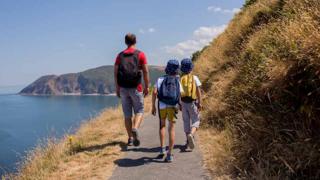 Image copyright
Getty Images
Image copyright
Getty Images
It is now possible to take a holiday in Scotland, Northern Ireland and England, following the relaxation of lockdown rules.
Holidays in Wales look likely to be allowed from the middle of July.
What's changed?
In Scotland, Northern Ireland and England, you are now allowed to stay overnight away from the place where you are living.
You can travel as far as you want within the borders of those countries, and sleep in a second home or self-contained holiday accommodation.
Hotels and B&Bs are also open, as well as many caravan parks and campsites, hostels and boarding houses.
Scotland expects to follow suit from 15 July.
In Wales, people will be allowed to travel more than five miles from their home from Monday.
The Welsh government has said that people can start booking holidays in self-contained accommodation for 13 July and onwards.
Hotels and B&Bs
Hotels and B&Bs have been asked to take a number of precautions when reopening. Among them:
Encourage guests to take stairs rather than lifts where practical Encourage the use of face coverings in the corridors Promote room service rather than communal dining rooms (and leave room service meals outside the door rather than carrying them in to the guests) Maintain effective social distancing between staff and guests - for instance, screens could be installed in front of the reception desk Image copyright Getty ImagesHostels
In hostels, shared sleeping areas such as dormitory rooms will not reopen except to people travelling as part of a household or support bubble.
Other shared facilities, such as communal kitchens or shower blocks, will remain shut, along with communal areas such as TV rooms, where social distancing is not possible.
Campsites and caravan parks
Campers and caravanners will notice a number of changes on site, although probably fewer than those encountered by hotel guests.
For instance, the Caravan and Motorhome Club, which operates more than 200 campsites in the UK, says that visitors will now check in by phone on arrival.
The government says that indoor shared facilities such as communal kitchens should remain closed. Bars and dining areas may be opened, but only if they can do so safely.
Shower facilities will be open, but they will be cleaned more often. Sites may choose to adopt staggered entry times and booked timeslots.
Toilet blocks will also be cleaned more regularly, and systems may be in place to control the number of people using them at any one time.
Image copyright Getty ImagesCan I go on holiday with friends?
In England, two households of any size can now meet up indoors - and this can be in shared accommodation away from home, for instance a cottage or apartment.
However, unless the households are part of the same support bubble, they will need to stay socially distanced from each other (a distance of "one metre plus" in England).
Government guidance states that the holidaymakers should "take particular care to maintain excellent hygiene - washing hands and surfaces - and avoid using shared facilities like bathrooms wherever possible".
It also advises that you should not share private swimming pools with anyone outside your household or support bubble, nor should you share a paddling pool or any sort of garden equipment.
In Northern Ireland and Scotland, overnight stays with another household are not allowed, so going on holiday with another family is not possible.

 5 years ago
643
5 years ago
643 

